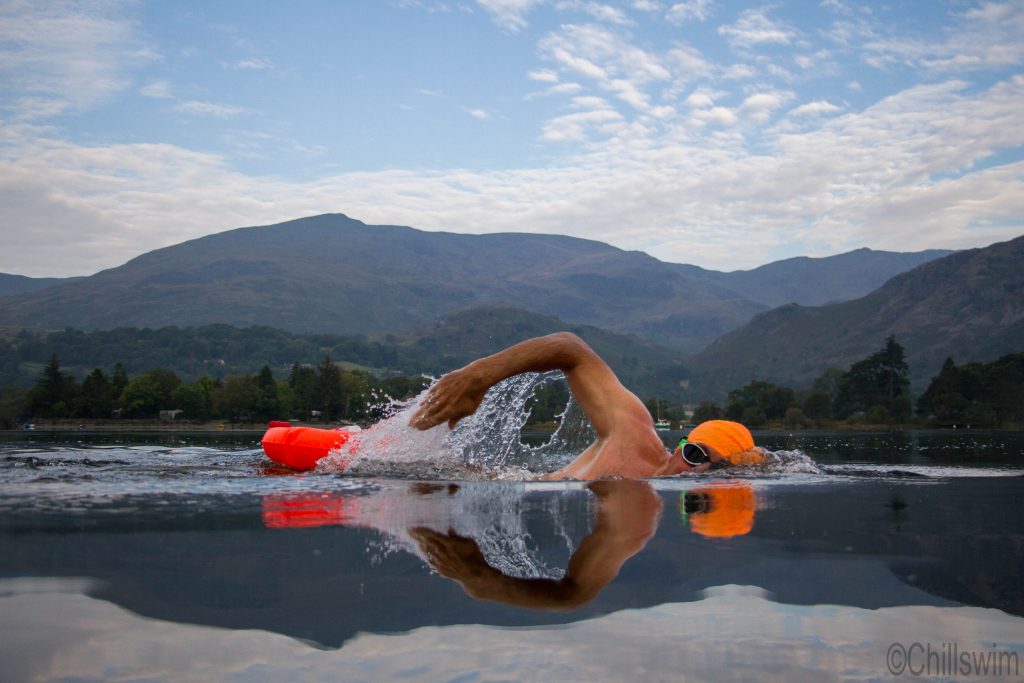I guess first of all I should quantify what I mean by cold water swimming. To some swimming in open water of 16 degrees can be cold, but for me cold water swimming involves Winter Swimming or Ice Swimming, which means the water is 5 degrees C or under with no wetsuit.
When you live in the UK and if you want to swim year round then why stop swimming in the outdoors during the winter? I lived and worked in London for two years whilst I was working on the 2012 Olympics and was a member of the Serpentine Swimming Club (Hyde Park, London) during this time. The club has been going for over 100 years and every single day someone has been swimming without a wetsuit year round. The mixed changing room is a hut next to the lake and during the winter hot teas are made for those who have been for a dip or swim in water.
There is a huge social aspect of winter swimming, the friendships you build up during those cold, dark mornings as you walk outside in the rain or snow to plunge into 3 degree water is wonderful. Then there is the feeling of wellbeing you get once you come out of a cold swim, although those experienced in cold water don’t hang around to chat, you must be disciplined enough to get warm clothes on straight away to allow your body to gradually warm up.
I have now taken part in three World Winter Swimming Championship events in London, Latvia and Finland. The races range from 25 meters head up breaststroke, 50meters freestyle and my personal favorite the ‘endurance swim’ of 450 meters. The rules are no diving in, no tumble turns and no wetsuits. In Finland the ‘pool’ area was cut out of the ice, and a team was on hand to scoop out freshly formed ice . The races (including relays) go on for three days, with a lot of social activities in the evening.
But to train up for an event like this I found myself heading up to the high mountain lakes in the Lake District, UK. Finding lakes half covered in ice to get used to the water temp affects on my body. Before the World Championships also took part in a winter swimming race in Siberia (air temp minus 15, water temp 0). This also included a long distance ice swimming event, where I managed to swim 1400 meters, taking over 20 minutes in 0 degrees. Winter swimming doesn’t stop when you exit the water, the feeling stays within you for hours and extreme ice swimming can take a long time in recovery where you gradually heat up the bodies core temp (to be honest for extreme swimmers this can be a painful experience as the warm blood returns to your extremities).
But winter swimming is becoming popular once again in the UK and I set up my own event ‘The Big Chill Swim’ in Windermere, with a weekend of races next to a four star hotel for the evening functions, swimmers flew in from Lativa, Finland, Russia, South Africa and Germany to take part alongside over 800 other swimmers. These are fun events both for the swimmers and spectators.
So next time you find your pool a little chilly when you are getting in, just remember if you can break the ice, then its ok to swim in!
Disclaimer! Obviously you need to remember your common sense when winter swimming. It takes a long time to become experienced enough to tackle long distances. Short dips are enough for most and hypothermia is something that you need to be aware of and not underestimate. Find other winter swimmers around you and enjoy going for short dips in cold water.
Check out Colin Winter swimming in Red Tarn, English Lake District
